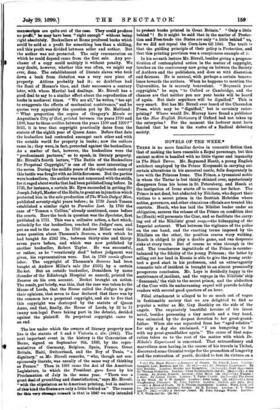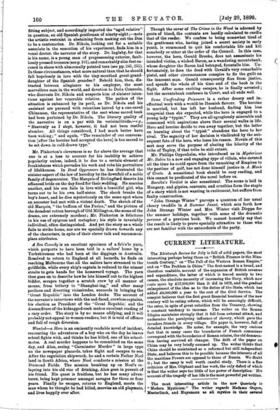NOVELS OF THE WEEK.* THERE ie no more familiar device
in romantic fiction than that of making the hero resemble a Royal personage, but this ancient motive is handled with no little vigour and ingenuity in The Black Terror. Mr. Raymond Heath, a young English architect employed by the Prince Kropenski in carrying out certain alterations in his ancestral castle, falls desperately in love with the Princess Irene. The Prince, a tyrannical noble in whom the Tartar is but thinly skinned over, mysteriously disappears from his house in St. Petersburg, and Heath at the instigation of Irene starts off to rescue her father. The Prince is not dead, but abducted by Nihilists, who deport their victims to a secret prison in the Scottish Hebrides where nobles, governors, and other obnoxious officials are treated like convicts. Heath, who has laid the Nihilist leader under an obligation, secures the release of the Prince on condition that he (Heath) will personate the Czar, and so facilitate the carry- ing out of the Nihilists' great coup,—the kidnapping of the Imperial autocrat. What between the vigilance of the police on the one hand, and the exacting terms imposed by the Nihilists on the other, the position craves wary walking. Heath is obliged to play a double game, and ran desperate risks at every turn. But of course he wine through in the end. The treacherous ingratitude of the Prince is counter- balanced by the fidelity of the young Princess ; the latter by selling out her land in Russia is able to give the young archi- tect a good start in his profession, and an extravagantly romantic tale of incident is brought to an almost prosaically prosperous conclusion. Mr. Leys is decidedly happy in the contrivance of incident, and the voyage in the Nihilists' ship Susannah,' the visit to the secret prison, and the abduction of the Czar with its embarrassing sequel will provide holiday readers with several good quarters of an hour.
Filial attachment is alleged to be so much out of vogue in fashionable society that we are delighted to find so popular a writer as Mr. Guy Boothby on the side of the angels. The exquisitely beautiful heroine of his latest novel, besides possessing a tiny mouth and a tiny hand, was animated by the deepest devotion to her great-grand- father. When she was separated from her "aged relative" for only a day she exclaimed, " I am hungering to be with my great-grandfather again." The cause of that sepa- ration takes us to the root of the matter with which Dr. Nikola's Experiment is concerned. That extraordinary and marvellous man having, in the course of his travels in Thibet, discovered sonic Oriental recipe for the promotion of longevity and the restoration of youth, decided to test its virtues on a
• (1.) The Black Terror: a Romance of Russia. By John K. Leys. London : Sampson Low, Marston, and Co. (3s. sd.]—(2.) Dr. Alkola's Experiment. By Guy Boothby. London : Hodder and Stoughton. [5s.]—(3.) Dead Oppr,ssors. By Thomas Pinkerton. London : Swan Sounenschein and Co. (68.)—(4.) A Sea Comedy. By Morley Roberts. London : John Milne. [2s. ed.)—(5.) Wanted — a Hero. By Jentier 'Tyler. London : T. Fisher Unwin. [Ca.)—(6.) The Crime to the Wood. By T. W. Speight. London : John Long. (3s. 6d.)—(7.) Some Unoffending Prisoners. By John Fullord. London : Jarrold and Sons. [is.) ----(it) A Monk of Crata. By E. Phillips Oppenheind Loudon : Ward, Lock. and Co. [3s. 6ii.]—(0.) Sarolia's Verdict. By E. Yolland. London : F. V. Wince and Co. (6s.]--(10.) A Suntiner Jaunt. By John Strange Winter. London : F. V. White and Co. [35. 6cti fitting subject, and accordingly imported the "aged relative" in question, an old Spanish gentleman of ninety-eight ;—note the artistic restraint in abstaining from making out the Don to be a centenarian. Dr. Nikola, looking out for a suitable associate in the execution of his experiment, finds him in a venal doctor, the narrator of the story. Dr. Ingleby, for that is his name, is a young man of prepossessing exterior, fault- lessly pressed trousers (see p. 101), and remarkably slim feet en- cased in shoes with abnormally pointed toes (see pp. 241, 253). In these circumstances, what more natural than that he should fall hopelessly in love with the tiny-mouthed great-grand- daughter of the Spanish grandee ? Behold him, then, dis- tracted between allegiance to his employer, the most marvellous man in the world, and devotion to Dona Consuelo, who distrusts Dr. Nikola and suspects him of sinister inten- tions against her venerable relative. The pathos of the situation is enhanced by its peril, as Dr. Nikola and his assistant are pursued with relentless hatred by a one-eared Chinaman, the representative of the sect whose sacred book had been purloined by Dr. Nikola. The literary quality of the narrative is on a par with its verisimilitude,—e.g.,
Heavenly as I slept, however, it had not been restful slumber. All things considered, I had much better have been waking ; " and again, "The remainder of our conversa- tion [after the heroine had accepted the hero] is too sacred to be set down in cold-drawn type."
Mr. Pinkerton's cleverness is so far above the average that one is at a loss to account for his inability to achieve popularity unless, indeed, it be due to a certain element of freakishness which pervades his work and robs his portraiture of lifelikeness. In Dead Oppressors he has illustrated the sinister aspect of the law of heredity by the downfall of a noble family of degenerates. The Marquis of Birlingfard deserts his affianced bride on the day fixed for their wedding. He marries another, and his son falls in love with a beautiful girl, who tarns out to be his own half-sister. The shock breaks the boy's heart, and he dies mysteriously on the same spot where an ancestor had met with a violent death. The sketch of the old Marquis, " the buffoon of the Furies," and the picture of the decadent rotten borough of Old Millington, the scene of the drama, are extremely mordant; Mr. Pinkerton is felicitous in his use of epigram and metaphor ; his style is invariably individual, often distinguished. And yet the story as a whole fails to strike home, nor are we specially drawn towards any of the characters, in spite of their clever talk and uncommon- place attributes.
A Sea Comedy is an excellent specimen of a fo'c's'le yarn, which purports to have been told in a sailors' home by a Yorkehireman who bad been at the diggings in Australia. Resolved to return to England at all hazards, he finds on reaching Melbourne that all the sailors have streamed to the goldfields, while every ship's captain is reduced to the utmost straits to gets hands for the homeward voyage. The yarn then goes on to describe how he lets himself out to the highest bidder, scrapes together a scratch crew by all manner of means, from bribery to "Shanghai-ing," and after many perilous and diverting vicissitudes, succeeds in bringing the Great Republic' into the London docks. The account of the narrator's interviews with the sad-faced, crewless captains, his election as President of the Great Republic,' and the discomfiture of the kidnapped cook makes excellent reading of a racy order. The story is by no means edifying, and it will probably not appeal to women-readers, but it is void of offence and full of rough diversion.
Wanted—a Hero is an eminently readable novel of incident, recounting the adventures of a boy who on the day he leaves school fights with, and thinks he has killed, one of his school- mates. A real murder happens to be committed on the same day, and Alan, seeing "Carminster Murder" in large type oa the newspaper placards, takes flight and escapes to sea. After the regulation shipwreck, he and a certain Father Noel land in South Africa, where Noel conducts a mission at the Diamond Fields. The mission breaking np on Noel's re- lapsing into bis old vice of drinking, Alan goes in pursuit of his friend. His quest is fruitless, but he has many adven- tures, being kept prisoner amongst savages for three or four• years. Finally he escapes, returns to England, meets the man whom he thought be had killed, marries an old playmate, and lives happily ever after.
Though the cover of The Crime in the Wood is 'adorned by gouts of blood, the contents are hardly calculated to curdle that of the reader. We confess to being somewhat tired of the gentleman who, having joined a secret society in early youth, is summoned to quit his comfortable life and kill somebody or other at the order of the Council. In this case, however, the hero, Gerald Brooke, does not assassinate his intended victim, a wicked Baron, as a wandering mountebank, whose daughter the Baron had betrayed, forestalls him. Un- iortunately, he does the deed with Gerald's very remarkable pistol, and other circumstances conspire to fix the guilt on the innocent man. Gerald consequently flies from justice, and spends the whole of his time•and of the book in the flight. After some exciting escapes, he is finally arrested ; but the mountebank confesses in Court, and all ends well.
Some Unoffending Prisoners is a rather dreary and in- effectual work with a would-be Ibsenish flavour. The heroine is married, but has left her husband, finding him less congenial than she expected, while the hero is engaged to a young lady "typist." They are all egregiously miserable and consumed with aspirations above their several walks in life. Hero and heroine decide to run away together, but the latter on learning about the " typist" abandons the hero to her rival. The sagacity of her decision is vindicated by the sub- sequent fate of the hero, who loses his reason. Novels of this sort may serve the purpose of abating the hilarity of the tribe of Tapley, if that tribe be still extant.
Mr. Phillips Oppenheim, who introduced us in Mysterious Mr. Sabin to a new and engaging type of villain, who devoted all the time he could spare from the unmaking of Empires to the pastime of golf, has not done himself justice in A Monk of Cruta. A sensational book should be easy reading, and this cannot be predicated of the novel before us.
Sarolta's Verdict is also sensational. The scene is laid in Hungary, and gipsies, convents, and cruelties form the staple of a story which is not wanting in excitement, but suffers from faulty construction.
"John Strange Winter" purveys a quantum of her usual cheery twaddle in A Summer Jaunt, which sets forth how John Strange Winter and Mrs. Winter visit Dieppe for the summer holidays, together with some of the dramatis persona of a previous book. We cannot honestly say that the result is likely to prove specially attractive to those who are not familiar with the antecedents of the party.



































 Previous page
Previous page